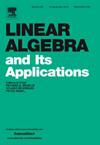Unique continuation principles for finite-element discretizations of the Laplacian
IF 1.1
3区 数学
Q1 MATHEMATICS
引用次数: 0
Abstract
Unique continuation principles are fundamental properties of elliptic partial differential equations, giving conditions that guarantee that the solution to an elliptic equation must be uniformly zero. Since finite-element discretizations are a natural tool to help gain understanding into elliptic equations, it is natural to ask if such principles also hold at the discrete level. In this work, we prove a version of the unique continuation principle for piecewise-linear and -bilinear finite-element discretizations of the Laplacian eigenvalue problem on polygonal domains in . Namely, we show that any solution to the discretized equation with vanishing Dirichlet and Neumann traces must be identically zero under certain geometric and topological assumptions on the resulting triangulation. We also provide a counterexample, showing that a nonzero inner solution exists when the topological assumptions are not satisfied. Finally, we give an application to an eigenvalue interlacing problem, where the space of inner solutions makes an explicit appearance.
拉普拉斯有限元离散化的独特延拓原理
唯一延拓原理是椭圆型偏微分方程的基本性质,它给出了保证椭圆型偏微分方程解一致为零的条件。由于有限元离散化是帮助理解椭圆方程的自然工具,因此很自然地要问这些原则是否也适用于离散水平。在这项工作中,我们证明了R2中多边形域上拉普拉斯特征值问题的分段线性和双线性有限元离散化的唯一延拓原理的一个版本。也就是说,我们证明了在三角剖分的某些几何和拓扑假设下,具有消失的Dirichlet和Neumann迹的离散方程- Δu=λu的任何解必须是同零的。我们还提供了一个反例,证明当拓扑假设不满足时存在非零内解。最后,我们给出了特征值交错问题的一个应用,在该问题中,内解的空间是显式的。
本文章由计算机程序翻译,如有差异,请以英文原文为准。
求助全文
约1分钟内获得全文
求助全文
来源期刊
CiteScore
2.20
自引率
9.10%
发文量
333
审稿时长
13.8 months
期刊介绍:
Linear Algebra and its Applications publishes articles that contribute new information or new insights to matrix theory and finite dimensional linear algebra in their algebraic, arithmetic, combinatorial, geometric, or numerical aspects. It also publishes articles that give significant applications of matrix theory or linear algebra to other branches of mathematics and to other sciences. Articles that provide new information or perspectives on the historical development of matrix theory and linear algebra are also welcome. Expository articles which can serve as an introduction to a subject for workers in related areas and which bring one to the frontiers of research are encouraged. Reviews of books are published occasionally as are conference reports that provide an historical record of major meetings on matrix theory and linear algebra.

 求助内容:
求助内容: 应助结果提醒方式:
应助结果提醒方式:


